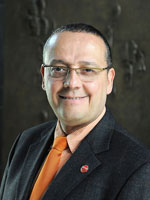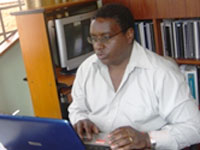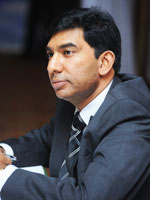Fogarty HIV trainees Drs Marcos Espinal, James Kiarie and N Kumarasamy making a difference
July / August 2012 | Volume 11, Issue 4
Fogarty's AIDS International Training and Research Program (AITRP), which began in 1988, has since provided significant research training to more than 2,000 individuals from more than 100 countries. Many of these trainees go on to have a meaningful impact in their communities.
Dr. Marcos Espinal
Helping set global TB policies
Dr. Marcos Espinal has traveled a long way from his job as a pediatrician in the Dominican Republic to his current post at the WHO's Pan American Health Organization (PAHO) in Washington, D.C. Today, he is involved in setting global policies for tuberculosis (TB) and multidrug resistant TB as chief of PAHO's Health Surveillance, Disease Prevention and Control.

Photo courtesy of
Stop TB Partnership
Dr. Marcos Espinal
While a pediatrician in Santo Domingo, Espinal was increasingly drawn to find out more about the diseases he was treating and decided to redirect his career toward research. He obtained master's and doctoral degrees at the University of California, Berkeley, supported by AITRP. Back in the Dominican Republic after his training, he investigated the interaction between TB and HIV/AIDS. He then went to Geneva to be executive secretary of the Stop TB Partnership.
Espinal's mentor at Berkeley, Dr. Art Reingold, said, "A lot of the work he's done as a Fogarty scholar on TB in the Dominican Republic was quite important, for example on the extent to which HIV influences the likelihood of transmission of TB from patients with pulmonary tuberculosis. He also produced a very important paper demonstrating that many of the people coming for HIV testing actually had undiagnosed, unsuspected, active pulmonary tuberculosis that was producing the symptoms that led them to come in for HIV testing."
Espinal said one of the many advantages of being a Fogarty trainee and studying in the U.S. was learning how to have a tough skin. "In developing countries, it's sometimes very difficult for people to absorb and digest critiques. Berkeley taught me to absorb criticisms and convert those into positive things," he said.
Dr. James Kiarie
Mentoring Kenyans in HIV research

Dr. James Kiarie
Dr. James Kiarie fell into research by serendipity and never looked back. He was training to be a clinician when his supervisor asked him to help enroll pregnant women in a clinical trial on mother-to-child transmission of HIV, led by scientists from the University of Washington. "I got interested in the whole concept of discovery, epidemiology and especially reproductive health research," he said. "But in Kenya, nobody was doing research as their career. Most people here are clinicians, teachers, and so on."
Kiarie finished his residency in obstetrics/gynecology, then leaped at the chance to study epidemiology under the AITRP grant to the University of Washington.
On returning to Kenya with a master's degree in public health, he secured Fogarty funding which opened the door to further grants and is now an author on more than 60 peer-reviewed scientific papers. An affiliate assistant professor at the University of Nairobi, he is the field site investigator for a Fogarty-supported clinical trial of herpes suppression among HIV-discordant couples and the main investigator in a trial on whether acyclovir prophylaxis can reduce HIV transmission.
Kiarie says the mentorship, grant-writing skills and knowledge he received as an AITRP trainee set the stage for his success, but networking has also been key. "The personal contact is very critical. Many of the people working together with me now were classmates in the master's program. That's where we met and we remained in touch and now write proposals together."
He says AITRP training began the cascade of research capacity building in Kenya and has influenced the country's training environment. "Kenya is now more focused on skills and competency. People are speaking up. There is definitely more use of IT in training than there was before, also the amount of contact students are able to get with the teachers, through one-on-one mentorship," Kiarie said.
"AITRP helped me get good training. It was for me a turning point," he concluded.
Dr. N. Kumarasamy
Helping India's HIV research blossom

Dr. N. Kumarasamy
Dr. N. Kumarasamy's job keeps getting bigger. He runs an HIV treatment clinic for 17,000 in Chennai, southern India, trains physicians, leads 12 clinical trials, is an author on almost 200 peer-reviewed scientific papers and participates on a WHO antiretroviral treatment guideline panel. But then there is much work to be done at one of the biggest HIV/AIDS clinics and research centers in India, the non-profit YRG Center for AIDS Research and Education (YRG CARE).
When HIV/AIDS broke out in India, YRG CARE focused on treating ailing patients, but had minimal research capacity. Kumarasamy, working as a clinician treating infectious diseases, wanted to know more. "I thought it would be helpful for clinicians to understand HIV in India, what happens to HIV-infected people, so I started studying them, understanding their HIV disease and also their behavior in the community," he said.
To enhance his research skills, he took a short-term course at Johns Hopkins University then a postdoctoral fellowship at Brown University, both times supported by AITRP program.
He immediately began implementing his skills back at home and helping position YRG CARE to participate in several key international HIV clinical trials. "Following my training through AITRP, I had the opportunity to train many clinicians and researchers. This has made a huge impact in my country as well as my institution. Some of those junior investigators are now procuring other types of grants from NIH or other sources to do research, so thereby the capacity building has certainly helped," said Kumarasamy, who is the organization's chief medical officer and directs the clinical program and clinical trials unit which has about 100 staff members.
His proudest achievement, he said, was steering a trial that confirmed the effectiveness and safety of generic antiretroviral drugs made in India. "Those drugs have helped in saving millions of HIV-infected people," he remarked.
To view Adobe PDF files,
download current, free accessible plug-ins from Adobe's website.